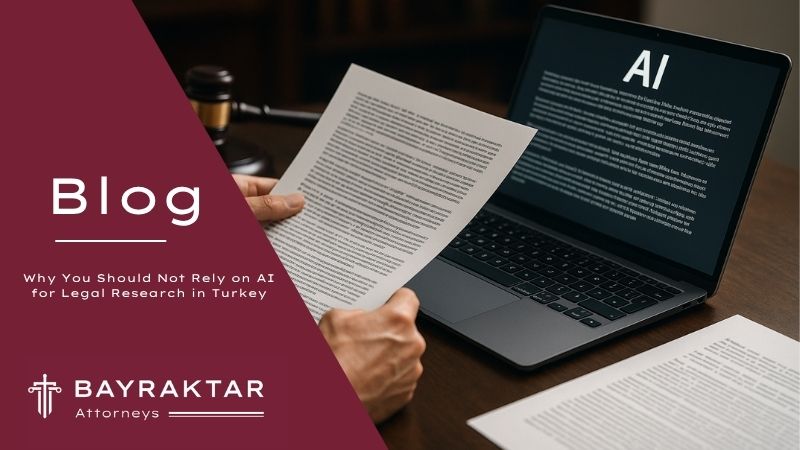
In recent years, artificial intelligence tools have become increasingly popular in the legal world. From summarizing court decisions to generating entire contracts in seconds, AI seems like a powerful assistant.
However, when it comes to actual legal research, especially within the complex and evolving legal system of Türkiye, relying on AI can lead to serious mistakes.
At Bayraktar Attorneys, we often review AI-generated legal content and find it either misleading or entirely wrong. While technology can support a lawyer's work, it can never replace the role of qualified legal professionals who understand the law not only by its text but also through its application, interpretation, and real-life consequences.
AI Often Misinterprets Turkish Laws
Most AI tools are trained on large volumes of data that may not include Türkiye's specific legal terminology, court decisions, or local practices. Even if the tool provides an answer that sounds legally correct, it may misinterpret the true meaning of the law due to the complexity of Turkish legal language.
Real Example from Our Practice
One of our clients asked ChatGPT whether a landlord can return the security deposit within three months after the rental agreement ends. The AI confidently answered yes, suggesting that this was allowed under the Turkish Code of Obligations. The client was preparing to delay their legal action based on this answer.
However, the truth is very different. The law does not grant landlords a blanket three month window to return the deposit. What the Code of Obligations actually says is that the deposit must be returned without delay once the landlord confirms that the property is in acceptable condition and no debts or damages remain.
The AI simply misunderstood a clause that deals with bank held guarantees and tried to generalize it. Had the client followed this AI generated advice, they would have lost their right to sue within the proper timeline.
AI Lacks Legal Judgment
AI does not think like a lawyer. It cannot assess whether a strategy is practical, whether a certain court is likely to accept a claim, or whether timing and venue affect your chance of success. It only reads and processes patterns in text.
For example, a client once asked us if they could apply for a long term residence permit in Türkiye after five years of continuous stay. The AI told them yes, without noting the specific requirement that the applicant must not leave Türkiye for more than 365 days in total or 180 days in any one year.
The client had multiple exits and entries. Had we not reviewed their border records ourselves, they would have filed a flawed application and lost time and legal standing.
AI Tools Cannot Follow Legal Updates
Turkish law is constantly evolving. Ministries regularly release new circulars. Courts issue decisions that completely change how laws are interpreted. Most AI tools operate on fixed training sets that are not updated in real time. Therefore, they often refer to outdated laws or misrepresent current regulations.
A foreign investor once used an AI tool to research tax exemptions for property sales in Türkiye. The AI said that if you hold the property for five years, you can sell it tax-free. While this was true years ago, the law had since changed.
We had to urgently explain that the required period had been extended to ten years for certain property types, and the investor risked a large tax bill had they trusted the AI alone.
Turkish Law Requires Human Interpretation
Even when AI gets the article number and text correct, it often misses the legal reasoning behind it. Legal practice in Türkiye is shaped not just by laws but also by how judges apply those laws, how local courts interpret ambiguous terms, and how bureaucrats enforce rules in practice.
In administrative law for example, we had a case where the immigration authority rejected a client’s residence permit renewal for not submitting a document that was not even listed on the official requirement list.
An AI model would never have foreseen such a real world requirement, but our legal experience allowed us to immediately appeal with case law and internal ministry communications that we had gathered through years of practice.
No Accountability or Legal Protection
If an AI tool gives you the wrong legal answer, there is no one to sue. No one will take responsibility. In contrast, lawyers are licensed professionals. We are bound by ethical duties and legal responsibility for the services we provide.
In Türkiye, only licensed Turkish lawyers can represent you in court or issue binding legal opinions.
Imagine using ChatGPT to prepare a rental contract. You go to court later, and the judge tells you the clause you included is invalid under Turkish consumer protection law. Who do you turn to? The answer is no one. You would be alone in facing the consequences.
AI Should Only Be Used as a Drafting Tool
Artificial intelligence can be useful for simple tasks such as:
Drafting a first version of a contract or letter
Translating simple legal terms between languages
Summarizing long documents
Generating questions to prepare for a consultation
But these tasks must be checked by a lawyer. AI should be viewed as a tool, not as a substitute for a qualified legal opinion.
Conclusion
Legal research requires more than reading laws. It requires understanding how those laws are interpreted, how they are applied in practice, and how to defend your position when something goes wrong.
AI cannot do that. In a system like Türkiye’s, where legal updates are frequent and interpretation plays a crucial role, relying on AI could result in lost rights, missed deadlines, or irreversible legal harm.
At Bayraktar Attorneys, we value innovation and use technology in smart ways, but we never let machines take the place of real legal thinking. Your future deserves proper legal protection, not guesses made by software.
Recently Added Blogs



.png)
.png)
.png)
.png)
